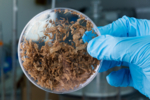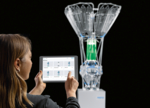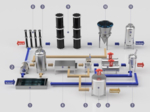Processes and technologies in the bioeconomy
The state of Baden-Württemberg is characterised by strong economic expertise in the field of plant and mechanical engineering as well as excellent research institutions in the fields of biology, biotechnology, bioprocess engineering and chemistry. These form an excellent basis for a sustainable economy by promoting technology development and innovation for tomorrow’s bioeconomy.
The creation of a biobased economy requires process innovations that enable the efficient utilisation of raw and residual materials. Process innovations in the bioeconomic sense include processes and technologies that use biogenic raw and residual materials as the starting substrate, as well as biobased processes that exploit the metabolic activities of living organisms such as microorganisms, bacteria or algae. In both cases, the goal must be to develop sustainable, flexible and cost-effective processes that can be scaled up quickly to industrial scale.
A huge variety of methods and processes is used in the bioeconomic area. The overall aim is to achieve a coupled and cascading use of biogenic raw material resources and residual materials. The main focus is on simple and combined chemical, physical and biotechnological/-catalytic conversion technologies.
The biorefinery concept is an intelligent and promising solution for replacing oil with biomass as a raw material to produce fuels, power, heat and chemicals. Biorefineries integrate different biomass conversion processes and technologies. The biorefinery approach is based on a holistic utilisation of biomass for producing value-added (intermediate) products. Thus, biorefineries aim for zero-waste biomass utilisation by applying efficient technologies to convert biomass into energy and products.
However, a biorefinery does not necessarily need to combine all process steps in one plant. Depending on the location, even small, modular plants can be the right choice for creating value with biomass. It is important that biomass digestion and conversion processes are resource-tolerant and flexible to take account of different biomass compositions and quantities of waste and thus process different material flows in one process step.
As the situation stands, new and improved technologies and processes are mainly being implemented in pilot and demonstration plants. Further efforts are needed to transfer applications to an industrial scale.



